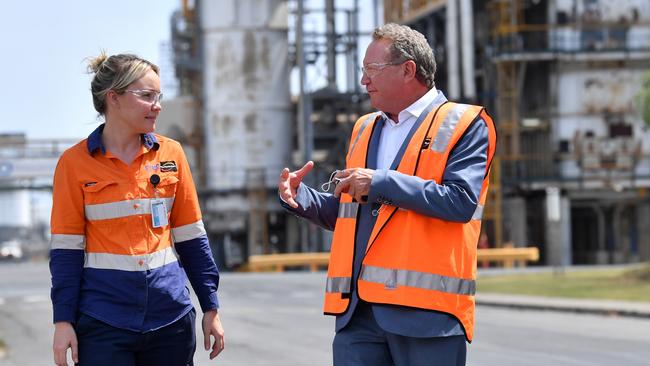Fortescue’s Forrest is ‘doing the numbers’ on hydrogen, says Incitec
Incitec Pivot says its project partner will do the sums on the feasibility of the stalled Gibson Island hydrogen plant as a result of the federal government’s subsidy scheme.

Andrew Forrest’s Fortescue will be “doing the numbers” on the stalled Gibson Island hydrogen plant in Queensland thanks to the federal government subsidy scheme bolstering the case for proceeding, according to project partner Incitec Pivot.
The Gibson Island project has been the flagship of Fortescue’s proposed hydrogen production centres in Australia but the company has delayed several investment decisions for moving forward with the development at Incitec’s former Queensland fertiliser plant.
“It’s early days (but) I’m sure they have been doing the numbers,” Incitec managing director Mauro Neves said. “We are hopeful that with the incentives that were put in place to make those projects economic … (it) will be more likely to happen.”
The Hydrogen Production Tax Incentive will provide a $2 incentive per kilogram of renewable hydrogen produced for up to 10 years per project between 2027-28, and 2039-40 for projects that reach final investment decisions by 2030.
“We have been talking about our work with Fortescue on the Gibson Island ammonia plant,” Mr Neves said.
“We have advanced that to engineering studies to the point where now we depend on the principal partner FFI (Fortescue Future Industries) to make a decision of initial financial closure on their side, and it is very much reliant on the cost of energy.”
Fortescue said in February it was still working on front-end engineering and design studies for the project “as Australia struggles to shed its petrostate status and still suffers structurally high green electricity costs”.
To prepare projects to become eligible for the tax credits, Labor has extended its so-called hydrogen headstart program.
Consultancy WoodMackenzie said Australian projects – particularly midstream processors – faced enormous cost competition from a sector dominated by China.
“Australian producers in the critical mineral space are likely to continue to need help from taxpayers to combat cheap credit, low energy costs, (and) supportive policies in other jurisdictions,” WoodMac’s metals and mining research head Robin Griffin said.
“Government support can help projects to derisk by providing support at critical moments where the market is too reticent to invest.”
WoodMac added that could be delivered in the form of equity or by filling a project debt stack by either filling shortfalls or providing lower cost capital that attracts other investors.
Still, the $2 incentive per kilogram would only cover part of the costs. The “green hydrogen production credit will be beneficial for project economics no doubt, but our current cost estimates are $US8.30 per kilogram for green hydrogen in Australia, and falling comparatively slowly to 2030,” Mr Griffin said.
“So $2/kg won’t immediately move the needle when we expect prices of maximum $3 to allow green hydrogen to compete into steel for example.”




To join the conversation, please log in. Don't have an account? Register
Join the conversation, you are commenting as Logout